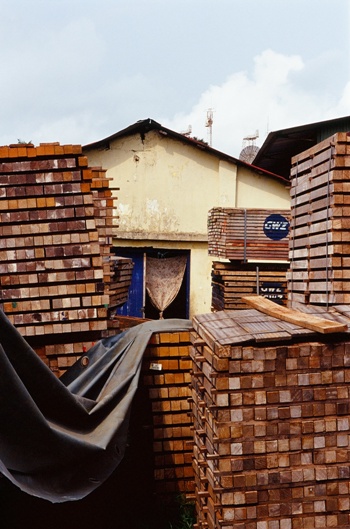One of Africa’s largest exporters of tropical hardwoods, Cameroon, has announced today a trade agreement with the European Union (EU) to rid all illegal wood from its supply chain to the EU and worldwide. Cameroon signed a legally-binding Voluntary Partnership Agreement (VPA) that will cover all wood products produced in Cameroon.
“As producers and consumers of tropical timber, Cameroon and the EU have a joint responsibility to eradicate illegal logging and related trade. This is good for Cameroon and good for European consumers, who remain as concerned as ever about climate change, which has forest degradation and illegal logging as one of its causes,” said Stefano Manservisi, Director General for Development of the European Commission in a press release.
Currently about 80 percent of Cameroon’s sawn timber exports go to the EU, while 60 percent of its log exports head to China. Cameroon’s total exports of wood and wood products reached nearly half a billion dollars in 2006, three-fourths of which went to EU member nations.
 Logs in harbour in Kribi, Cameroon, waiting to be shipped to Doula for international export. Photo by: Jade Saunders |
“Cameroon is well aware of the importance of fair and legal timber trade that we seek to establish through various measures we have taken since 2000. This includes the benefits to 70 local communes and communities of more than 60 billion FCFA [local currency] through allocated fiscal revenue. We are convinced that FLEGT [Forest Law Enforcement Governance and Trade] will strengthen governance and fiscal revenue and strengthen the overall third place of forests among economic sectors,” commented Cameroon’s Minister of Forest and Wildlife, Elvis Ngolle Ngolle.
The agreement states that by 2012 all wood-products from Cameroon to the EU must have a license showing they were legally obtained. In addition, the agreement states that the wood products must have been harvested in a way that retains the health of the nation’s forests and gives benefits back to forest communities.
Almost half of Cameroon today is under forest cover: approximately 20 million hectares. From 2000-2005 Cameroon lost about 220,000 hectares of forest annually, a rate of nearly one percent. From 1990-2005, Cameroon lost 13.4 percent of its forest cover or 3.3 million hectares. Illegal logging has long plagued the central African nation, while much of the nation’s wood has been harvested unsustainably by foreign companies.
Related articles
Forestry sector needs transparency to reduce risks of REDD
(01/25/2010) A new project aims to increase transparency in the forestry sector, an area long plagued by corruption and mismanagement.
Ghana becomes first country to sign sustainable timber pact with the E.U.
(09/04/2008) The European Union has signed a sustainable forestry deal with Ghana that would stop imports of illegally-harvested timber from the West African nation, according to a statement released by the European Forest Institute. The agreement comes under the European Commission’s 2003 Action Plan on Forest Law Enforcement, Governance and Trade (FLEGT), which seeks to address illicit timber imports. The regulation requires chain-of-custody documentation for timber to be imported into the E.U.
Carbon traders, not conservationists, could save Cameroon rainforest
(02/15/2008) The government of Cameroon is looking to lease 830,000 hectares of biodiverse tropical forest to conservationists for an annual sum of $1.6 million. The problem? No conservation groups are interested. Apparently the asking price is too high, according to The Economist.